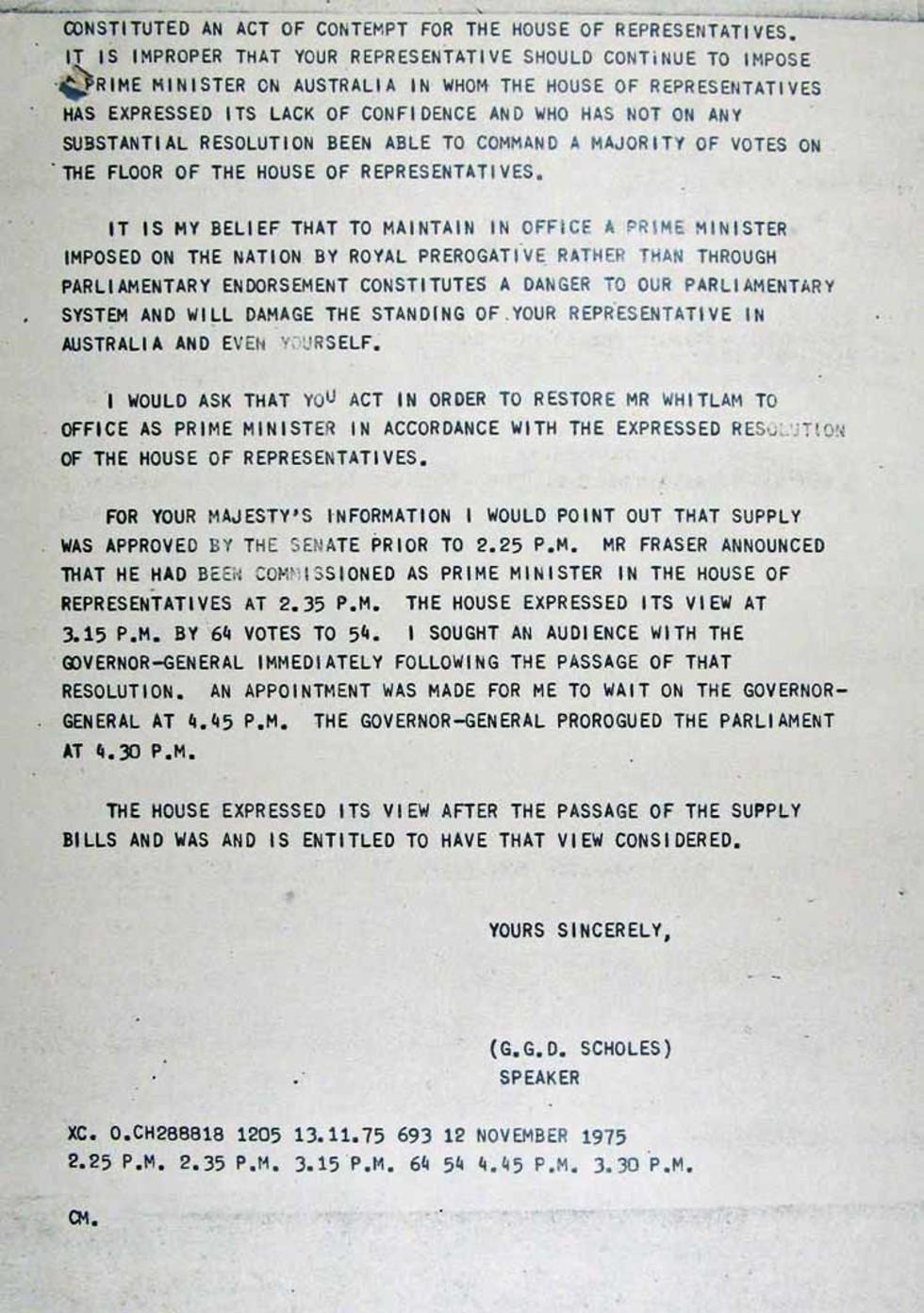

Aboriginal and Torres Strait Islander people should be aware that the National Archives' website and collection contain the names, images and voices of people who have died.
Some records include terms and views that are not appropriate today. They reflect the period in which they were created and are not the views of the National Archives.



[Page 1.]
[Underlined header:] AUSTRALIAN HIGH COMMISSION, LONDON
INTERNATIONAL MESSAGE [end header.]
O.CH288818 1205 13.11.75 UNC
TO.
PP LONDON/693
FM. [From] CANBERRA /
[Stamped in black ink: ‘PRIORITY’, ‘DISTRIBUTION’, ‘ACTION: H. C.’, ‘INFM’N: [information] HC DHC MIN OS’.]
UNCLASSIFIED
FOR HIGH COMMISSIONER FROM THE SECRETARY.
PLEASE PASS THE FOLLOWING LETTER FROM THE HON, G.G.D. SCHOLES, SPEAKER OF THE HOUSE OF REPRESENTATIVES, TO HER MAJESTY THE QUEEN.
[Handwritten:] 2. THE ORIGINAL LETTER FOLLOWS BY BAG. [end handwritten.]
BEGINS:
12 NOVEMBER 1975
YOUR MAJESTY,
I AM COMPELLED BY EVENTS INVOLVING YOURSELF THROUGH YOUR REPRESENTATIVE IN AUSTRALIA, HIS EXCELLENCY THE HONOURABLE SIR JOHN KERR, A.C., K.C.M.G., K.ST.J., Q.C., TO COMMUNICATE MY
CONCERN AT THE MAINTENANCE IN THE OFFICE OF THE PRIME MINISTER OF THE HON. MALCOLM FRASER, M.P. DESPITE HIS LACK OF MAJORITY SUPPORT IN THE HOUSE OF REPRESENTATIVES.
IMMEDIATELY FOLLOWING THE ANNOUNCEMENT OF THE DISMISSAL OF THE FORMER PRIME MINISTER, MR. WHITLAM, AND MR. FRASER’S APPOINTMENT, THE HOUSE OF REPRESENTATIVES CARRIED A RESOLUTION EXPRESSING WANT OF CONFIDENCE IN THE GOVERNOR-GENERAL’S NOMINEE AND REQUESTING THE RE-INSTATEMENT OF THE FORMER PRIME MINISTER IN WHOM THE HOUSE EXPRESSED CONFIDENCE.
I AM SERIOUSLY CONCERNED THAT THE FAILURE OF THE GOVERNOR-GENERAL TO WITHDRAW MR. FRASER’S COMMISSION AND HIS DECISION TO DELAY SEEING ME AS SPEAKER OF THE HOUSE OF REPRESENTATIVES UNTIL AFTER THE DISSOLUTION OF THE PARLIAMENT HAD BEEN PROCLAIMED WERE ACTS CONTRARY TO THE PROPER EXERCISE OF THE ROYAL PREROGATIVE AND
[Page 2]
CONSTITUTED AN ACT OF CONTEMPT FOR THE HOUSE OF REPRESENTATIVES. IT IS IMPROPER THAT YOUR REPRESENTATIVE SHOULD CONTINUE TO IMPOSE A PRIME MINISTER ON AUSTRALIA IN WHOM THE HOUSE OF REPRESENTATIVES HAS EXPRESSED ITS LACK OF CONFIDENCE AND WHO HAS NOT ON ANY SUBSTANTIAL RESOLUTION BEEN ABLE TO COMMAND A MAJORITY OF VOTES ON THE FLOOR OF THE HOUSE OF REPRESENTATIVES.
IT IS MY BELIEF THAT TO MAINTAIN IN OFFICE A PRIME MINISTER IMPOSED ON THE NATION BY ROYAL PREROGATIVE RATHER THAN THROUGH PARLIAMENTARY ENDORSEMENT CONSTITUTES A DANGER TO OUR PARLIAMENTARY SYSTEM AND WILL DAMAGE THE STANDING OF YOUR REPRESENTATIVE IN AUSTRALIA AND EVEN YOURSELF.
I WOULD ASK THAT YOU ACT IN ORDER TO RESTORE MR WHITLAM TO OFFICE AS PRIME MINISTER IN ACCORDANCE WITH THE EXPRESSED RESOLUTION OF THE HOUSE OF REPRESENTATIVES.
FOR YOUR MAJESTY’S INFORMATION I WOULD POINT OUT THAT SUPPLY WAS APPROVED BY THE SENATE PRIOR TO 2.25 P.M. MR FRASER ANNOUNCED THAT HE HAD BEEN COMMISSIONED AS PRIME MINISTER IN THE HOUSE OF REPRESENTATIVES AT 2.35 P.M. THE HOUSE EXPRESSED ITS VIEW AT 3.15 P.M. BY 64 VOTES TO 54. I SOUGHT AN AUDIENCE WITH THE GOVERNOR-GENERAL IMMEDIATELY FOLLOWING THE PASSAGE OF THAT RESOLUTION. AN APPOINTMENT WAS MADE FOR ME TO WAIT ON THE GOVERNOR-GENERAL AT 4.45 P.M. THE GOVERNOR-GENERAL PROROGUED THE PARLIAMENT AT 4.30 P.M.
THE HOUSE EXPRESSED ITS VIEW AFTER THE PASSAGE OF THE SUPPLY BILLS AND WAS AND IS ENTITLED TO HAVE THAT VIEW CONSIDERED.
YOURS SINCERELY,
[Space for signature.]
(G.G. SCHOLES)
SPEAKER
XC. O.CH2888818 1205 13.11.7.693 12 NOVEMBER 1975
2.25 P.M. 2.35 P.M. 3.15 P.M. 64 54 4.45 P.M. 3.30 P.M.
CM.
This document is a ‘priority’ letter for Her Majesty the Queen, sent from Gordon Scholes, the Speaker of the Australian House of Representatives, on the day following Prime Minister Whitlam’s dismissal on 11 November 1975. The letter was sent to the Queen by way of the Australian High Commissioner in London.
Scholes expresses his concern about the actions of Governor-General Sir John Kerr—not only for the dismissal but also for appointing the Leader of the Opposition, Malcolm Fraser, as caretaker prime minister. Scholes requests that the Queen reinstate Whitlam to the office of Prime Minister, because he still retained the support of the House of Representatives.
Learning resource text © Education Services Australia Limited and the National Archives of Australia 2010.
Learn how to interpret primary sources, use our collection and more.
